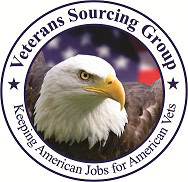John Cassese, who had already started two information technology companies, was watching 60 Minutes with his wife several years ago when a segment profiled the plight of homeless veterans in San Diego. Turning to his wife, he said, “These are our heroes? This is how we, as a country, take care of them?” The question hung in the air; not one that was easily answered. In that silence, the wheels of a new business venture—founded in patriotism and altruism—were set into motion.
Reaching out to several colleagues, Cassese, the managing partner of information technology staffing and consulting firm C&L Group, quickly assembled a team and mapped out a business model that he fully believed could put thousands of veterans to work. He was not only concerned about the homeless veteran, but also the multitudes of other veterans coming off military deployment who might find themselves scraping by without work in a post-recession economy.

Founder, Dan Liebman
Large and mid-sized corporations around the country hire temporary staff each day, millions a year, to handle everything from manual work to accounting and information technology. They also outsource millions of dollar’s worth of work. Putting thousands of veterans to work, thought Cassese, was a simple as each company committing a small percentage of those temporary assignments and/or those outsourced projects to veterans.
So Veterans Sourcing Group, one of the few staffing firms for veterans, was created to fulfill this mission. Veterans Sourcing Group offers staffing solutions for all kinds of needs, from administrative, to all professional services, including information technology, accounting, legal, finance, clerical, administrative, and even light industrial.
Veterans Sourcing Group was formed as a partnership between C&L Group executives and Bob Jones, a Vietnam veteran and returned POW who owns West Point Services (WPS), a service disabled veteran-owned small business (SDVOSB). The C&L Group helps Veterans Sourcing Group recruit and train vets for jobs, as well as provide expertise in project management and quality assurance. Since 2006, the C&L Group has been a major provider of IT services across a broad spectrum of platforms.

The executive teams at C&L Group and Veterans Sourcing Group are no stranger to the staffing and outsourcing industries. Many of them formed the management team at Computer Horizons Corporation, an IT staffing and solutions firm that grew to about $500M in revenue before it was sold about a decade ago.
Companies such as ADP, Pfizer, Pitney Bowes, Morgan Stanley, Exelon, MetLife and UBS have taken advantage of Veteran Sourcing Group’s services.
Veterans Sourcing Group has two objectives, according to Jones, a West Point grad: “Getting jobs for veterans and providing corporate America with quality solutions to IT and other staffing and outsourcing issues. You can’t have one without the other,” he says.
There has been a major emphasis on the hiring of veterans over the last several years, from President Obama on down to local officials. There are also private groups such as Wounded Warriors and Veterans on Wall Street, both of which are partly sponsored by VSG, supporting vets as they enter the workforce. This is in stark contrast to those returning from the Vietnam War, as Jones remembers. In the 1970s there was a real bias against hiring young veterans. Their treatment was regrettable in a number of areas—no opportunities or outreach, no companies trying to recruit them.
Today, companies have diversity hiring and supplier diversity programs that include efforts to provide contracts to veterans and service disabled veteran-owned businesses. Still challenges exist on the hiring side, as a good portion of these firms soon find out that they are not well equipped to successfully recruit veterans with the qualifications they need. Fortunately, these diversity hiring programs are being augmented by supplier diversity programs. Because Veterans Sourcing Group is a staffing firm, many corporations are typically able to count staff they supply toward their diversity hiring goals.
Companies that hire veterans and serviced disabled veteran-owned small businesses are helping themselves and their country in three ways: they’re hiring quality solutions, employing vets, and keeping jobs in the United States, rather than offshoring.
Offshore outsourcing, which was an extremely popular tactic for corporate America to reduce expenses and enhance profitability in the 1990s and early 2000s, has become a political football of sorts, as domestic unemployment figures have increased after 2008’s financial crisis. Veterans Sourcing Group provides not only a way for veterans to get back to work, but also an opportunity for companies to “rural source,” a cost-effective way to outsource and take advantage of skilled labor pools outside of the major urban centers.
Still, despite the inroads, Cassese, Jones and the staff at Veterans Sourcing Group continue to push with procurement, diversity, and hiring executives at those companies throughout corporate America which have not yet made commitments to support veterans in a meaningful way.
Cassese points to efforts, such as the 100,000 Jobs Mission, which began with eleven top companies, but expanded to forty-one companies by March 2012, and continues to expand. But just as corporate America begins to make some headway, a drawdown of overseas troops will result in the return of 1.2 million military personnel over the next five years.
“Many states and a large number of major businesses recognize veterans as part of their diversity efforts,” says Cassese. “However, there’s a lot of work to be done in order to help these veterans re-enter the workforce. Based on the economics, it will be difficult for more than one million jobs to be created.”
The answer, at least temporarily, may lie in the use of service disabled veteran-owned staffing and outsourcing firms which are employing veterans themselves, according to Jones.
“These veterans have a lot to offer and America has to get them back to work any way possible,” said Jones. “Veterans bring more than just a set of technical skills or standard industry experience with them: they bring the leadership skills and discipline they learned in the military, and they understand mission, teamwork, and getting the job done.”






